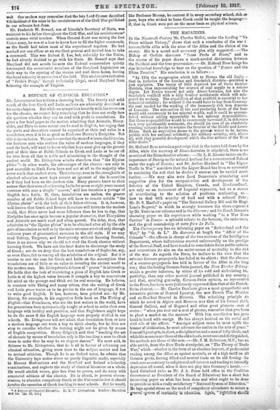A DEFENCE OF CLASSICAL EDUCATION.•
Mn. Lrmessroxe has written a charming book. The beauty and solid worth of the best Creek and Latin authors are admirably described in his main chapters. But while we sympathize heartily with his reverence for the classics, we cannot help remarking that ho does not really face the question whether they can be read with profit is translations. He gives a few brief pages to the matter, admitting that Aristotle, Thucy- didee, and Plato to some extent can be read in English, but urging that the poets and dramatists cannot be appraised at their real value in a translation, even if it be as good as Professor Murray', Euripides. But this is inconclusive. We can foresee that the man of science, the historian, the business man who realizes the vaino of modern languages, if they read the book, will want to know whether boys must give up the greater part of their time at Public Schools to Greek and Latin or be out off for ever from all that is noble and stimulating in the thought of the ancient world. Mr. Livingstone admits elsewhere that " the Elysian plains "—in other words, the advantages of the classics—are only in part accessible to Sixth Form boys and not at all to the majority who never reach that exalted state. That is to say, oven in the strongholds of classical education most boys remain as ignorant of the humanities as if they had been on the modem aide. Many parents know to their sorrow that their sons after learning Latin for seven or eight years cannot construe with ease a simple " unseen," still less translate a passage of English Into Latin. If, then, translations are useless, the greater number of old Public School boys will have to remain outside " the Elysian plains" with the bulk of their fellow-citizens. It is, however, well temern that Greek and Roman literature still interests the modern world, that Plato never had more followers than he has to-day, that Euripides has once again become a popular dramatist, that Thucydides and Aristotle are much read and often quoted. We infer, then, that admission to "the Elysian plains" is to be obtained after all by the side gate of translation as well as by the main entrance attained only through toilsome years of grammatical exercise, In the old style. If we may read Tolstoy, Targenev, and Dostoyevsky without knowing Ruselsn, there is no reason why we should not read the Greek classics without knowing Greek. We have not the least desire to discourage the study of Greek ; nor do we deny that the best translations of Sophocles, say, or even Plato, fail to convey all the subtleties of the original. But it is unwise to rest the case for Greek and Latin on the assumption that translations are of little or no value In revealing the ancient world to the modern man. Mr. Livirgetone's defence of " proses " is interesting. He holds that the task of translating a piece of English into Greek or Latin is of the highest value because It compels a boy to concentrate his mind on the passage and think out its real meaning. He believes, in common with Thring and many others, that the writing of Greek and Latin prose trains us to be precise in the use of language, if not to write good English. It has, however, been pointed ont—by Mr. Hartog, for example, in his suggestive little book on The Writing of English—that Frenchmen, who are the best writers in the world, have for generations been systematically taught at school to write their own language with lucidity and precision, and that Englishmen might hope to do tho same if the English language were properly studied in our schools. Mr. Livingstone will not admit that translation from or into a modem language can train a boy to think clearly, but he does not stop to consider whether the training might not be given by means -of English composition. Henry Sidgwick said that " teaching the art of rhetoric by means of translation only is like teaching a man to climb trees in order that he may be an elegant dancer." We must add, in fairness to Mr. Livingstone, that he is all In favour of reforming our classical education, giving more time to the subject-matter and less to textual criticism. Though ho Is an Oxford tutor, he admits that the University lays undue stress on purely linguistio study, especially in Honour Moderations and the Hertford and Ireland scholarship examinations, and neglects the study of classical literature as a whole. He would abolish verses, give less time to proses, and do away with annotated editions of the classics. He is afraid, in present circum- stances, to abandon compulsory Greek at- the Universities lest it should ,involve the cessation of Greek teaching in most schools. But he would, A 'Defence of Claartcat Education. BF Livinatcaa. Loudon : etacmelau and Co. IL. dd. neat
like Professor Murray, be content if in every secondary school, rich or poor, boys who wished to learn Greek could be taught the language — if, that is, Greek were put on the same basis as physical science.


































 Previous page
Previous page